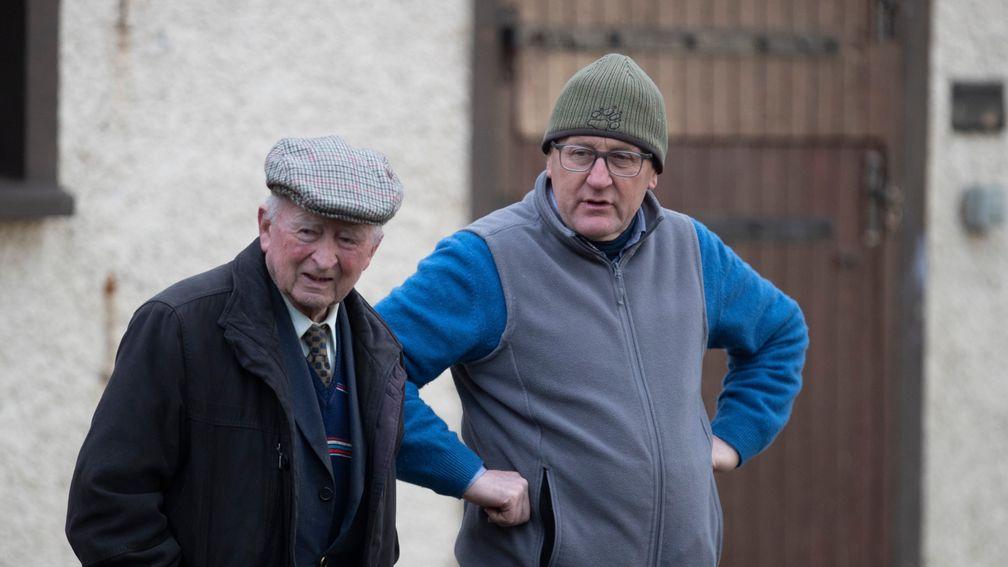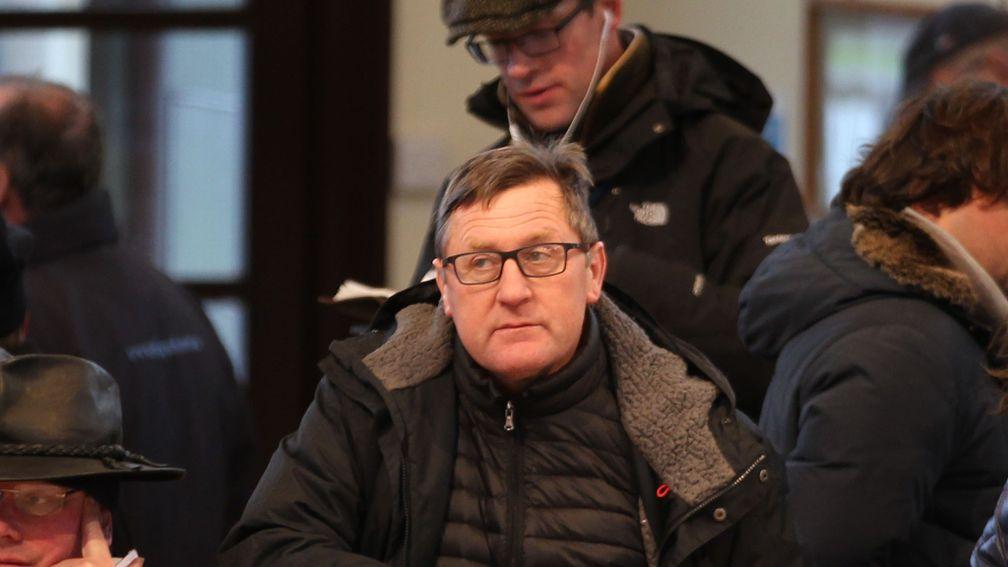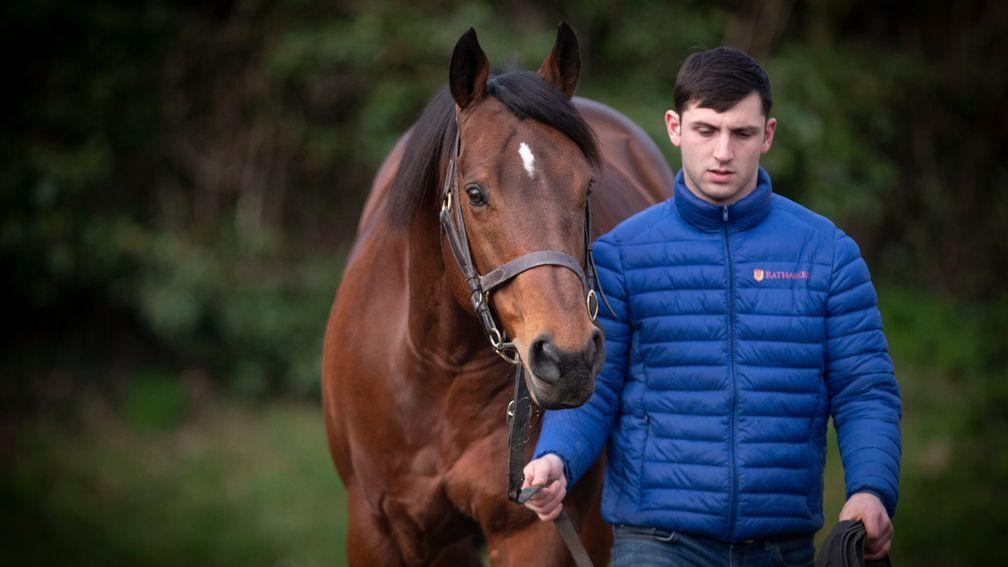- More
'We can get through this' – Maurice Burns maintains hope for the industry
Martin Stevens goes to the Rathasker Stud man for his thoughts on lockdown

In times of crisis it is natural to seek counsel and comfort from those who have served longest in the bloodstock industry. Having steered their businesses through several market downturns and disease outbreaks, they are better placed than most to put matters into perspective.
It is reassuring, then, that one such stalwart thinks the likely dip in trade caused by the absence of racing and sales due to lockdown measures to slow the spread of the coronavirus will likely be a short, sharp shock that we will be able to recover from relatively quickly.
Maurice Burns, who has stood stallions at Rathasker Stud for more than 30 years and observed his father Paddy's many successes as a breeder, as well as those of his brothers Patrick and Seamus, echoes the thoughts of many when he says it is the lack of clarity on the racing programme and sales calendar that is causing the most consternation.
“If we can just get to a point where we know when racing will resume, then sales will fall into place and a lot of confidence throughout the industry will return,” he says. “We'll have a clearer picture and be better placed to plan ahead.
“Of course we have to ensure health services are not under pressure, as they need ambulances and doctors at each track and we can't keep those from the front line. But that will come.
“I look at it like this: the engine of the industry has stopped; it'll take a while to get it restarted but eventually we'll get into a rhythm and it'll stay warm.
“Trainers will have winners, prize-money will be circulated and owners will rediscover their enjoyment of the game. Punters will bet again and bookmakers will flourish, even if they're not laying on course to begin with.”

Not that Burns is sweeping potential problems for stud farms and sales companies under the carpet, and he acknowledges several particular issues that he will have to tackle while running a commercial operation as much as anyone else.
Taking them in order of their occurrence in the stockman's almanac, first come the stallions, though they present fewer risks at present. The leading light of the Rathasker Stud ranks is the popular Bungle Inthejungle, whose first two crops have yielded Group-winning two-year-olds Living In The Past and Rumble Inthejungle.
He is joined by Anjaal, who supplied Weatherbys Super Sprint scorer Bettys Hope in his freshman season last year; Coulsty, who has debut juveniles run for him in 2020; and elder statesman Clodovil and son Gregorian.
There is a certain irony in that the rush by Flat breeders to use the stallions as early as possible in the year has insulated that side of the business for Burns, to a degree.
“As it happens, the Flat breeding season is gradually drawing to a close anyway; nobody seems to want May foals any more,” he reflects. “Yet if the mares were left to their own devices they wouldn't be cycling until now; they would naturally be coming into season at this time of year to foal in April, May or even June.
“It's not nature's intention to have foals born in snow in January, and by the time the progeny turn three, a later foaling date shouldn't really matter anyway.”
Burns reports that covering activity at Rathasker has been “tipping away well” although he adds that mare owners have been choosy in the types of sire they are using.
“Breeders are being more careful and are sticking with proven stallions where there is less risk,” he says. “Those with their first foals, yearlings or two-year-olds on the ground will struggle more. Although I gather the first-season sires have been extremely busy, as per usual.
“Bungle Inthejungle is going well, Anjaal and Coulsty were a bit harder going. Clodovil just had a Listed winner in Sweden by about nine or ten lengths [Duca Di Como, in the Listed ITM Spring Mile at Jägersro].
“Clodovil struggles with his fertility but remains popular with ourselves and shareholders. He's the perfect choice for young or maiden mares as he gets something like 60 per cent winners to runners, so he'll get them off to a good start. He's 20 now so owes us nothing; he's done the job for us and we'll look after him.”
A pregnant mare is likely one of the safest assets in these uncertain times, Burns says, as those breeding to sell the produce as foals or yearlings will be doing so in late 2021 or the autumn of 2022, when some semblance of normality will hopefully have returned.
“The people who will likely be more terrified are the breeze-up vendors and those traders with yearlings to sell this season, who don't know when sales will take place,” he adds.

Another pernicious side-effect of the lockdown that has received less of a public airing is the confusion it is causing for staffing on studs.
“There have been no yearling inspections so we haven't had the normal conversations with sales companies to know which horses will be going for what sale,” Burns explains. “Not having a plan is the hardest thing.
“We're getting to the stage where more and more of the foals are over 30 days old and can go out into the paddock, so the workload in the yard is dropping off and the staff will want to organise their holidays – and rightly so as they've been working hard,” he continues.
“But it's hard to know when the staff will be needed, as if there are still August yearling sales then the yearlings will need to come in to begin prep from around the end of May. We're in limbo.”
Burns thinks vendors will get through the sales season, as long as there are suitable opportunities to trade. He suggests a delay and spacing out of yearling auctions, which would be made possible by staging breeding-stock sales in January instead of in their normal November and December slot on a one-off basis.
“I expect it will be the same old story at the yearling sales – the top end will be most sought after, the middle will be 50/50 and the bottom of the market will be tough, but then it's tough every year,” he says.
“The burden will be spread as most of us have a few horses for the premier sales, a few for the middle sales and the ones who will be at lesser sales – not necessarily because they're not nice horses but because their sires aren't fashionable or the mare hasn't produced enough winners yet.
“This season will be about moving on the horses and turning over the money.
“One worry, though, is how concentrated the yearling sales season will be,” he goes on to say.
“It seems that Keeneland can hold a successful breeding-stock sale in January each year and I wonder whether for one year only we should hold our breeding stock sales in early 2021 to take the pressure off the front of the season and reduce the need to squeeze in fixtures. I can't see any reason why not?
“It seems logical to fix the last sale we need to take place and to work back from there, and spread out the sales.”
Collaboration will be of utmost importance to solving the puzzle of how and when to stage sales while western European countries wrestle with emerging safely from lockdown, Burns stresses.
“The key thing is that sales companies will need to speak to each other,” he says. “I know they're rivals but they'll have to work together as most of their vendors will have horses in all of their sales.
“And hopefully they'll listen to all their vendors, not just the elite Book 1 consignors. It's encouraging to see that they're pulling together to make the breeze-up season work.”
To return to the crunch question of how worried Burns thinks we should be in the face of unprecedented challenges the coronavirus pandemic is throwing at the industry, he says: “It won't be as bad as the downturn ten or 12 years ago: that was an economic situation, this is a medical disaster.
“The market was tipping along quite nicely until lockdown, so there's hope that when this virus is under control we might eventually be able to get back to where we were.
“Of course there'll be a hit this year, the horses we were selling for £100,000 last year might make £50,000 in the worst-case scenario; but the important thing is we'll be trading.”
And trading in a depressed market will bring its own opportunities.
“When everyone is in selling mode, it can be a good time to find a bargain,” Burns says. “Owners might get a Royal Ascot winner for half what they used to pay.
“People might be taking a closer look at the breeding-stock sales to see if there's a chance to get into a pedigree they could never afford in the past. And if they land on the right one at the right price they could set themselves up with a foundation mare they'll be reaping the rewards from for the rest of their lives.”
But in a crisis like this, as Burns reminds us, the state of the market isn't everything.
“These are desperate times but the important thing is our health,” he sums up.
“As long as we're alive and kicking we can get through this.”
Read our Life in Lockdown Q&As with industry figures
Tom Goff: 'I've painted two garden seats. God, I sound so middle-aged!'
Simon Sweeting: 'Rightly or wrongly I'm having all my mares covered'
Richard Kent: 'Stud fees and sales house charges will have to come down'
Philippa Mains: 'The industry is a family and we help each other out'
Claire Goodwillie: 'People have realised if you're not online you're invisible'
Tina Rau: 'I'm enjoying post-dinner quarantinis with friends over video call'
Daniel Creighton: 'The market will recover – the only question is when'
Ed Player: 'We're happy to move with the times and embrace online trading'
Patrick Sells: 'Chasemore Farm is effectively operating in a bubble'
Chad Schumer: 'Racing in the US being cancelled is the biggest frustration'
Tom Blain: 'Trade will be down but all we can do is roll with the punches'
Ted Voute: 'We'll need to strengthen the way we showcase young stock'
Simon Kerins: 'We'll embrace any format that will help get horses sold'
Barry Lynch: 'The industry has often bounced back as quickly as it dipped'
Tim Lane: 'Working with horses does you the world of good in these times'
Jerry Horan: 'My sister butchered my haircut. I think it was payback'
Violet Hesketh and Mimi Wadham: 'Social distancing isn't hard - just lonely!'
Henry Beeby: 'Nick Nugent and I have entered a beard growing competition'
Charles O'Neill: 'ITM will be ready to go when the markets open up again'
Freddy Powell: 'We're improving our online sale platform in case it's needed'
Bumble Mitchell: 'Online sales could be tricky for outlying studs like mine'
David Stack: 'I had to give a garda a lesson about the birds and the bees'
Colm Sharkey: 'I've been torturing myself trying to sort out my golf swing'
Rachael Gowland: 'I didn't realise how much I loved racing until I couldn't go'
Sam Hoskins: 'I've been listening to endless Cold War podcasts on my tractor'
Niamh Spiller: 'Video calls are very important to keep everyone motivated'
Jamie Lloyd: 'Staff have had all their own gear labelled, even wheelbarrows'
Micheál Orlandi: 'The stallions are flying and that gives me great hope'
Richard Venn: 'The French are in a good position to get back racing sooner'
Tim Kent: 'It's difficult to plan when we don't know when racing will resume'
Russell Ferris: 'Weatherbys had contingency plans that we activated at once'
Grant and Tom Pritchard-Gordon: 'Inglis Easter has kept us busy since January'
Peter Hockenhull: 'The social side of meeting and chatting to breeders is gone'
Polly Bonnor: 'We've fulfilled every feed order, including all our exports'
Richard Lancaster: 'We're fortunate that some Shadwell staff live on site'
Published on inNews
Last updated
- Royal Ascot winner Arizona on the move as Coolmore sire joins the exodus to Turkey
- Something different for Burrows as Group 1-winning trainer consigns at the Tattersalls Cheltenham December Sale
- Breeding right to Blue Point sells for €430,000 on Darley winning bid platform
- Classic hero Metropolitan set for strong home support with Etreham busy at the sales
- 'It has been nothing short of incredible' - Grace Hamilton on Godolphin Flying Start experience
- Royal Ascot winner Arizona on the move as Coolmore sire joins the exodus to Turkey
- Something different for Burrows as Group 1-winning trainer consigns at the Tattersalls Cheltenham December Sale
- Breeding right to Blue Point sells for €430,000 on Darley winning bid platform
- Classic hero Metropolitan set for strong home support with Etreham busy at the sales
- 'It has been nothing short of incredible' - Grace Hamilton on Godolphin Flying Start experience